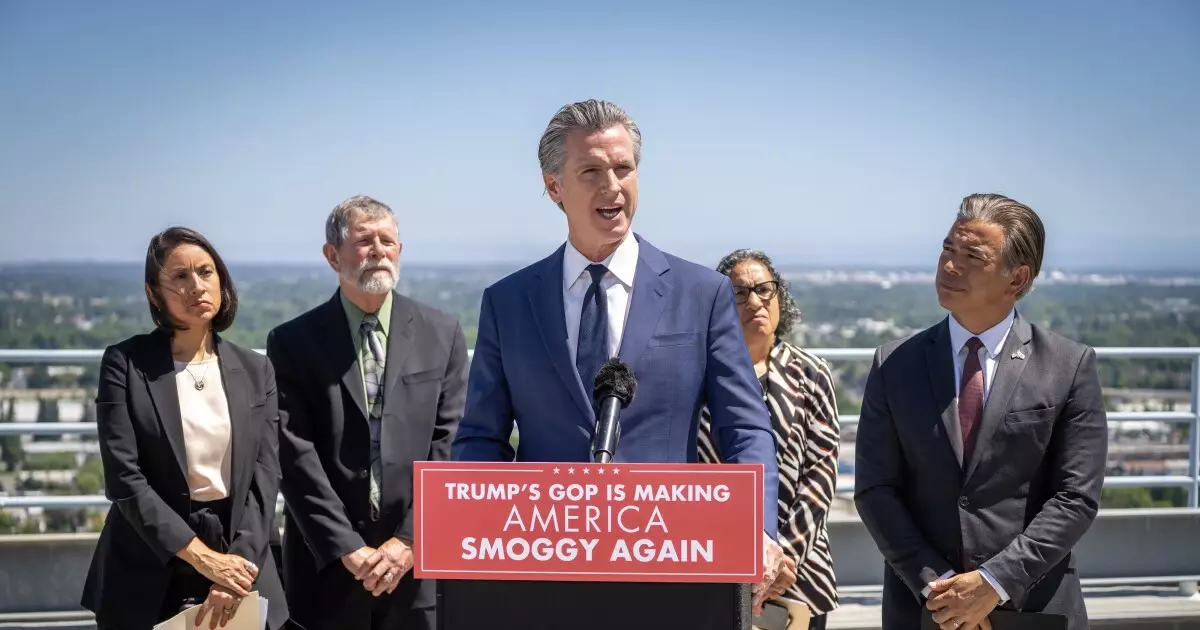Amidst the cacophony of American politics, the tension between state rights and federal oversight has reached a fever pitch, particularly concerning environmental regulations. California’s recent announcement to sue the Trump administration marks the state’s 23rd legal battle against the former president. With the federal government poised to retract California’s leading-edge vehicle emission standards, Governor Gavin Newsom’s administration stands firm against what can only be described as a regressive push to prioritize corporate interests over public health and environmental sustainability. This is not merely a dispute over state versus federal authority; it symbolizes the battle for an environmentally conscious future against a political landscape increasingly riddled with shortsightedness.
Emissions Regulations: A Beacon of Progress
California has long set the standards for environmental regulations, boasting waivers from the EPA that date back to the 1960s, allowing the state to implement emission laws that are stricter than federal mandates. The current federal move to repeal Governor Newsom’s ambitious plan for phasing out fossil-fuel-powered vehicles by 2035 is a clear affront to decades of progress. This plan represents years of hard work by climate activists, scientists, and policymakers who recognize that clean air is a fundamental human right. Yet, the Trump administration’s apparent disdain for state-level environmental leadership seems to indicate a preference for short-term economic gains over long-term sustainability.
Notably, California’s stricter regulations align with historical precedence set by bipartisan leaders, including both Nixon and Reagan. It illustrates a point often lost in today’s polarized environment: that fighting for clean air and sustainable practices transcends party lines. The abrupt federal attempt to dismantle these stricter regulations not only jeopardizes health—particularly for vulnerable populations in areas rife with air pollution—but also undermines the long-term economic viability of the state and the nation.
The Economic Argument: Innovation vs. Obsolescence
The Trump era might be characterized by increased production and job creation, yet this is a hollow promise if it comes at the expense of significant environmental degradation. The fossil fuel industry has thrived under a deregulated environment, but California’s forward-thinking policies present tangible opportunities for innovation in electric vehicle (EV) manufacturing. By rolling back these stringent emissions standards, the Trump administration jeopardizes America’s competitive edge against countries like China, where governments aggressively support green technologies.
Newsom’s argument that “this is a big day for big oil, and for China” does not merely frame the debate in nationalistic terms but highlights a crucial economic insight: the global race towards renewable technologies is on. States like California are not just leading the way in environmental policies—they are also pushing realms of economic development that prioritize clean energy. Hence, the lawsuit represents more than a legal maneuver; it embodies the fight for an economic future unshackled from fossil fuels and fully engaged with technological advancement and sustainability.
Health Implications: A Crisis Unfolding
As highlighted by state officials, California holds five of the ten cities with the highest air pollution in the country. Even though greenhouse gas emissions have seen a notable decline, legacy pollution continues to affect millions, with high rates of asthma and cardiovascular diseases among the state’s vulnerable populations. This context cannot be overlooked; rolling back emissions standards is not an abstract political decision but has real implications for public health. The notion that political maneuvers can dictate the quality of the air we breathe is alarming. Inaction in the face of this imminent health crisis could have irreversible consequences, particularly for low-income communities disproportionately affected by pollution.
Newsom and California Attorney General Rob Bonta’s remarks emphasize that allowing these rollback efforts will threaten not only the health of Californians but also undermine economic stability and prospects for future generations. When policies prioritize corporate welfare over the well-being of our communities, we must question the fundamental values underpinning such decisions.
The Broader Political Context: A Call for Unity
This lawsuit comes at a time when America’s political fabric appears more frayed than ever. The question arises: how can we foster dialogue and collaboration on critical issues like climate change? History has illustrated that environmentalism can transcend partisan divides, and this misalignment should compel bipartisan cooperation to fight for cleaner air and sustainable solutions. Sadly, the present administration’s viewpoint seems mired in outdated ideologies, casting aside crucial environmental gains made by previous bipartisan efforts.
Thus, California’s legal fight against the Trump administration is about more than just pushing back against a particular policy; it is about rekindling a national conversation about accountability, public health, and the economic implications of environmental stewardship. This political battle signifies a broader need for a recalibration of our priorities as a nation—championing environmental health must be salvaged from political divisiveness for the sake of future generations. The stakes have never been higher, and California’s fight is a litmus test for the whole country.


Leave a Reply